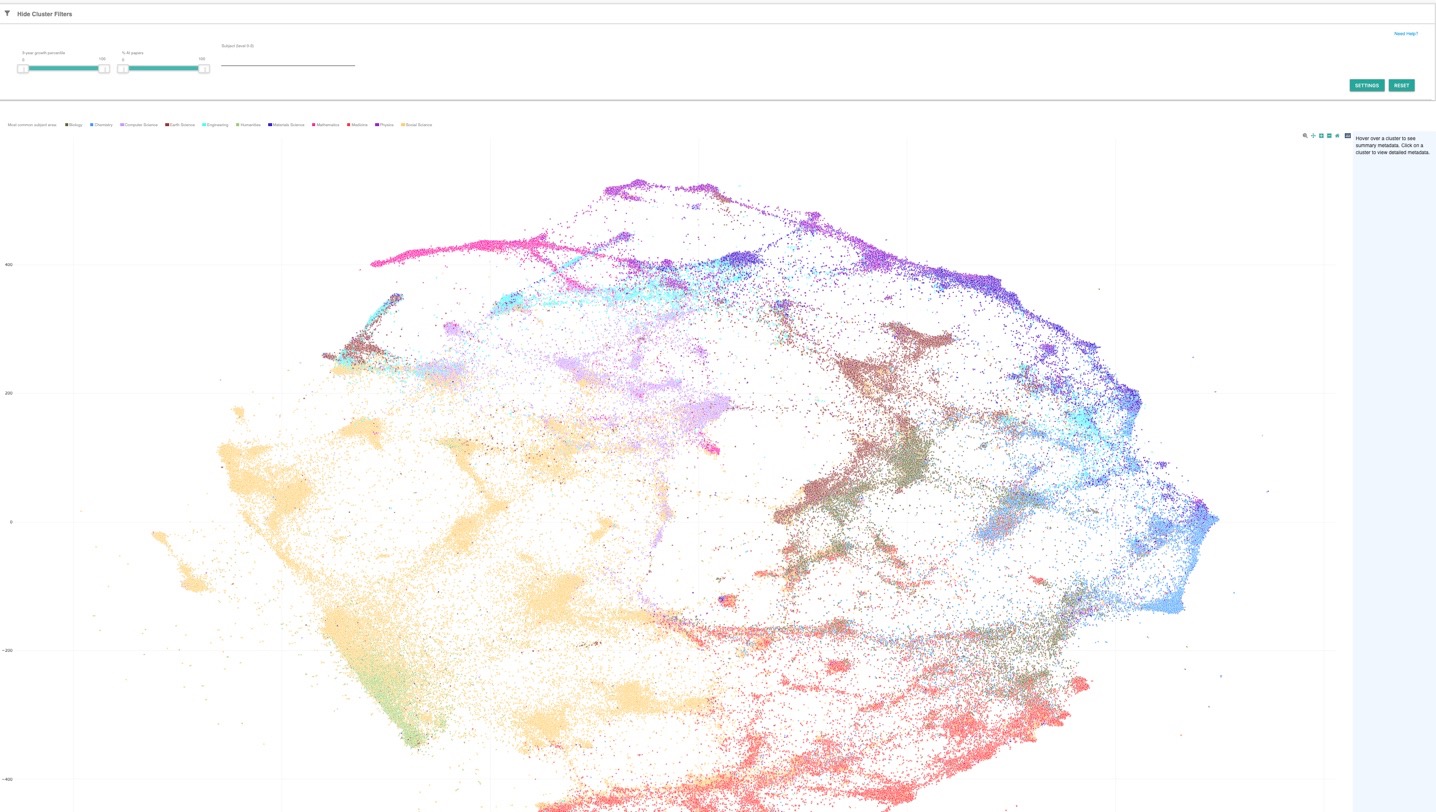Since its inception, social media has emerged as an instrument of radicalization and a notorious source of recruitment for fringe groups—including religious fundamentalists and white or male supremacists—that pose terrorist threats both domestically and abroad.1 Social media is a rich source of data for AI-supported risk assessment, surveillance, sentiment analysis, and other forms of research, enabling researchers to both understand and potentially mitigate radicalization among at-risk individuals globally. There appears to be relatively high growth in research at the intersection of social media and terrorism, with a subset of this research significantly incorporating AI-related methodologies.
To explore the intersection of AI, terrorism, and social media research, we examined research clusters (RCs) in CSET’s Map of Science. We selected RCs that contained research foci in both terrorism and social media using paper-subject keywords, CSET-identified keywords, and Microsoft Academic Graph classifications; this method captured six RCs, all within the social science branch of research.2
The six resulting RCs are summarized in Table 1. Five of the RCs examine the general flow of information on social media as is pertinent to terrorism. Only two of the RCs identified have Middle Eastern or Islamic fundamentalist-related keywords, including “Islamic state” and “Islam.” This finding highlights that research at the intersection of social media and terrorism may be broadening away from its previously narrow focus on Islamic fundamentalism.3
Table 1. AI, terrorism, and social media cluster summaries
| Cluster ID | Selected subjects and MAG classifications | % of AI papers | % of NLP papers |
| 23460 | Internet, social network, context, internet privacy | 15.8 | 8.5 |
| 126567 | Politics, criminology, development, digital revolution, state, computer science | 6.5 | 6.5 |
| 51156 | Cognitive psychology, anxiety, anger, context, affect | 2.9 | 1.8 |
| 59580 | Islam, narrative, terrorism, media studies, politics, | 1.7 | 2.6 |
| 72977 | Political science, political economy, criminology, mass media, public relations | 0.7 | 1.8 |
| 106334 | Globalization, political economy, public relations, public administration | 0 | 0 |
Only one RC contains more than minimal AI research: 16% of papers in RC 23460 are AI-related, which puts it under the “cross-disciplinary” AI/ML research bin.4 RC 126567 contained 6% AI-related papers, so it falls into the “limited contribution to AI research” category. However, these values could be underestimates, as each of the 6 RCs were missing AI classifications for at least 25% of their papers.5
Growth in related RCs over time
RCs with research at the intersection of social media and terrorism grew faster in 2020 than RCs overall. However, RCs with research at the intersection of social media and terrorism grew somewhat slower in 2020 than RCs with research on social media or terrorism exclusively.
Figure 1. Mean RC growth in number of papers
RC 23460
To explore the role of AI research in terrorism and social media RCs, we can look at RC 23460 more closely. In addition to social media and terrorism, this RC focuses on politics, gender studies, and data science. The number of papers in this RC grew 36% in 2020. English-speaking countries dominated this RC, with the United States by far in the lead.
Figure 2. Top author-country affiliations
In addition to top affiliated countries, we can review a cluster’s core papers, which are the most frequently cited papers in that RC; core papers can provide additional insight into the composition of a cluster.
Table 2. Core papers in RC 23460
Conclusion
AI and in particular, NLP technologies, have the potential to make social science research focusing on social media and terrorism much more powerful. For example, researchers can use feature extraction, linguistic analysis, and other methods that employ machine learning to tease apart differences in radicalization methods on social media.6 This information could help policymakers and companies develop solutions to counter such extremism. These research fields’ future growth remains to be seen.
- E.g. https://www.start.umd.edu/pubs/START_PIRUS_UseOfSocialMediaByUSExtremists_ResearchBrief_July2018.pdf; https://www.rand.org/blog/2018/12/isiss-use-of-social-media-still-poses-a-threat-to-stability.html; https://www.cpr.org/2021/01/20/far-right-extremists-on-social-media-arent-going-away-theyre-hunkering-down/
- We also searched using a variety of other keywords, including “supremacy,” “extremism,” and “radicalization,” without significant results. No RCs included both “radicalization” and social media or terrorism as a result, and 2 RCs (10496 and 121026) total included “radicalization” as a subject term.
- When we ran this analysis in March 2021, 5 of 9 RCs returned focused on Islamic fundamentalism, a majority. This paper is based on updated clusters using a reconfiguration of the science map and update of the data to include more 2020 and some 2021 research.
- See Locating AI Research in the Map of Science by Autumn Toney at https://cset.georgetown.edu/publication/locating-ai-research-in-the-map-of-science/
- Papers may lack AI classifications if they are not in English or in Chinese, or if they are older papers published before 2010.
- E.g. A survey on extremism and natural language processing (2016) by Torregrosa et al. on arXiv at https://arxiv.org/pdf/2104.04069.pdf.
